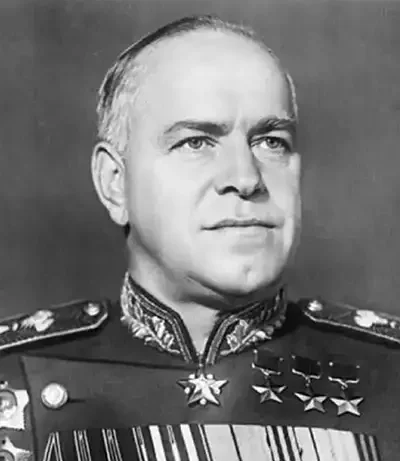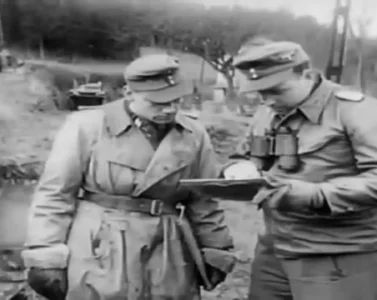- Military History
- Biographies
- Militarians Biographies
- General Georgy Zhukov
General Georgy Zhukov
During the Second World War, Zhukov oversaw some of the Red Army's most decisive victories and was the most acclaimed Soviet military commander of that period
Georgy Konstantinovich Zhukov was born in a village in Kaluga Province, southwest of Moscow, at the end of 1896. He joined the Novgorod dragoons in 1915, rose to sergeant, and twice received the St. George's Cross. After learning military tactics in the Czar's army, Zhukov joined the new Red Army when the Bolshevik Revolution brought down the Czar.
He advanced rapidly in the communist forces, rising to squadron commander by 1922. Zhukov attended the Frunze Military Academy from 1928 to 1931, commanded a division of troops by 1934, and advanced to corps commander in 1936. Zhukov avoided the terrible purges carried out by Joseph Stalin during the late 1930s.
In 1939, he was sent east to meet a threat from Japan. Zhukov planned and carried out a brilliant battle strategy that cost the Japanese sixty thousand casualties in the Khalkhin Gol campaign, ensuring that Russia's eastern front would remain quiet throughout most of World War II. He became chief of staff of the Soviet Army in 1940 and was made a full general the same year. Zhukov played an active role in retraining and reshaping the Soviet Army after its deficiencies were shown in the Russo-Finnish War of 1939 and 1940.
Like Stalin, Zhukov was lulled to sleep as far as the Germans were concerned; the Nazi invasion of Russia in June 1941 took him thoroughly by surprise. As Russia fought for survival against the German invaders, Zhukov played an increasingly larger role. He commanded the defense of the central and Leningrad fronts in 1941 and organized the reserve units that stopped the Germans just short of Moscow in December 1941.
Zhukov received the title of first deputy commissar for defense, meaning that after Premier Stalin, he was the overall commander of the Soviet war effort. Zhukov organized, though did not carry out the counterattack at Stalingrad in 1942, and he was prominent in the liberation of Leningrad. Made a full Marshal of the Soviet Union, Zhukov led the troops that captured Berlin in April 1945, ending the war.
After the German capitulation, Zhukov became the first military commander and governor of the Soviet Occupation Zone in Germany in 1945. A war hero, hugely popular within the Soviet military and with the allied forces in Germany, Zhukov was increasingly viewed by Stalin as a potential threat to his leadership. In 1946 he was stripped of his position as Commander-in-Chief of the Soviet Ground Forces and assigned command of the Odessa Military District, far from Moscow and lacking in strategic significance and troops.
In February 1948, Zhukov was given another secondary posting, this time as a commander of the Urals Military District. At the beginning of 1953, Stalin ordered Zhukov to leave this post and to return to Moscow, but didn’t give him any tasks. After Stalin's death in March of this year, Zhukov returned to favor and was appointed Deputy Defense Minister in 1953 and later, after ensuring that Nikita Khruschev came to power in 1955, Minister of Defense under premier Nikolai Bulganin and full member of the Politburo.
He became the highest-ranking military professional who was also a member of the Presidium of the Central Committee of the Communist Party. He was not only a symbol of national strength but also an internationally well connected and powerful leader with strong views that not always aligned with the Soviet ideology. His opponents accused him of being a Reformist and Bonapartist which in the end was most probably one of the key factors for his dismissal in October 1957. Zhukov’s reputation was rebuilt by Brezhnev in 1964 and a year later, he was invited to sit on the tribunal of the Lenin Mausoleum and given the honor of reviewing the parade of military forces in Red Square.
After Zhukov’s forced retirement, he concentrated solely on writing his memoirs "Reminiscences and Reflections" (Воспоминания и размышления) , which were only published 1969 because of his deteriorating health. The book became a bestseller and was highly praised.
On June 18, 1974, Georgi Zhukov, the greatest Russian leader during the Great Patriotic War as the Russian call World War II, died aged 77 from a long-time heart disease after yet another stroke. Contrary to Zhukov's last will for an Orthodox Christian burial, and despite the requests of the family to the country's top leadership, his body was cremated, and his ashes were buried at the Kremlin Wall Necropolis alongside fellow generals and marshals of the Soviet Union and later the Russian Federation.
General Georgy Zhukov - Quick Facts
- Russian Empire (1700 - 1917)
- Russia Soviet Union (1918-92)
- Imperial Russian Army (Russian Empire)
- Soviet Army
- General
- Marshal
- WWI (1914-1918)
- Russian Civil War (1917-1922)
- WWII (1939-1945)
- {{#owner}}
- {{#url}} {{#avatarSrc}}
{{name}} {{/url}} {{^url}} {{#avatar}} {{& avatar}} {{/avatar}} {{name}} {{/url}} - {{/owner}} {{#created}}
- {{created}} {{/created}}
























